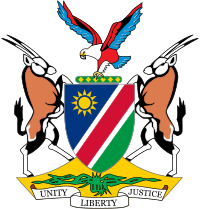VISION
Foreign policy
The prime objective of Namibia’s foreign policy is the promotion of national security, peace and prosperity. Our government strives, together with the majority of the world’s nations, to ensure good faith in multilateral negotiations and collective action with a view to enhancing global peace and security.
Namibia understands very well the need to interact with the rest of the world, as we pursue our national interests. Article 96 of the Namibian Constitution stipulates that Namibia will:
• Adopt and maintain a policy of non-alignment;
• Promote international co-operation, peace and security;
• Create and maintain just and mutually beneficial relations amongst nations;
• Foster respect for international law, treaties and obligations; and
• Encourage the settlement of international disputes by peaceful means.
Vision 2030
Namibia’s Vision 2030 provides the long-term development framework for the country to be a prosperous and industrialised nation, developed by her human resources, enjoying peace, harmony and political stability. Vision 2030 visualises that Five-Year National Development Plans would be the main vehicles for achieving its objectives and realizing the long-term Vision. Accordingly, successive National Development Plans (NDP) will contain the goals and intermediate targets (milestones) that will eventually lead the nation to the realization of the Vision.
NDP3, spanning the five-year period 2007/08 to 2011/12, was launched in November 2008 and implementation has taken effect. The theme for NDP3 is “Accelerating Economic Growth and Deepening Rural Development”, and the goals of NDP3 have been derived from the Vision 2030 document, the 2004 SWAPO Party Manifesto, the directions from a November 2005 Cabinet Retreat, the Millennium Development Goals, and the lessons learned from implementing the NDP2.
Economic Diplomacy
In its quest to uplift the standard of living and prosperity of all its peoples, the government adopted the strategy of economic diplomacy. The objectives of economic diplomacy are explicitly outlined in the White Paper on Foreign Policy and Diplomacy Management, adopted by Parliament in 2004.
Economic relations are now, clearly, a priority in Namibia’s interaction with the international community. With an economy that is largely based on the extraction and export of primary commodities and a society many of whose people live below the poverty line, Namibia is a country that is very anxious to achieve rapid economic growth and, consequently, a significant reduction in the absolute number of the absolute poor. And to achieve this national aspiration, it is estimated that the economy must grow by at least 7% GDP annually.
But over the last few years, the economy’s average annual growth rate has been 4% GDP. One of the reasons why the economy is growing at such a slow pace is that the country’s domestic productive base is quite narrow. This is why government has opted to pursue an outward-looking strategy for economic growth and development. Export-push is a central element of that strategy of economic development. Exports, and especially manufactured, non-traditional products, are key to the expansion of the country’s economy. Hence, the need to place economic diplomacy as the cornerstone and main pre-occupation of our foreign policy operations.
